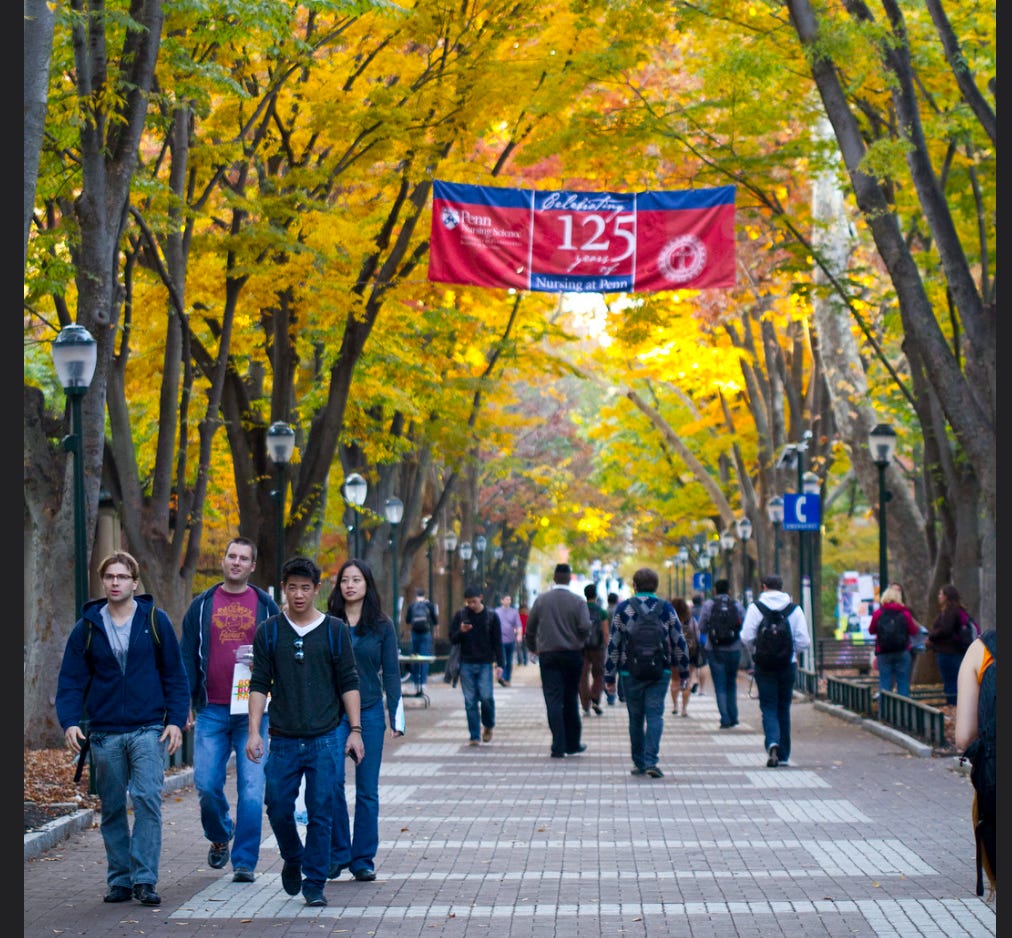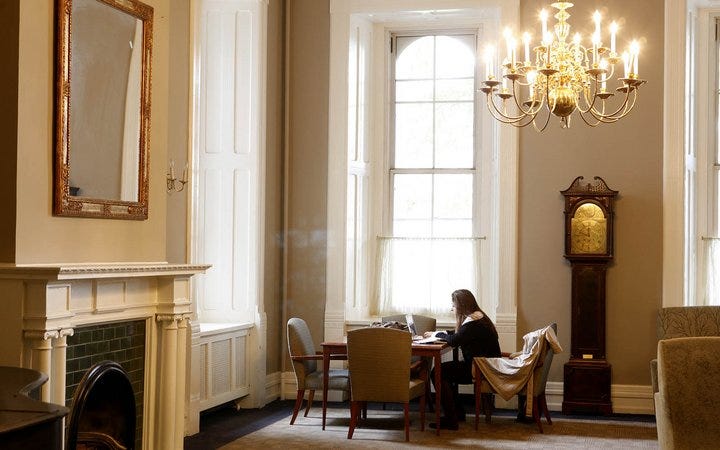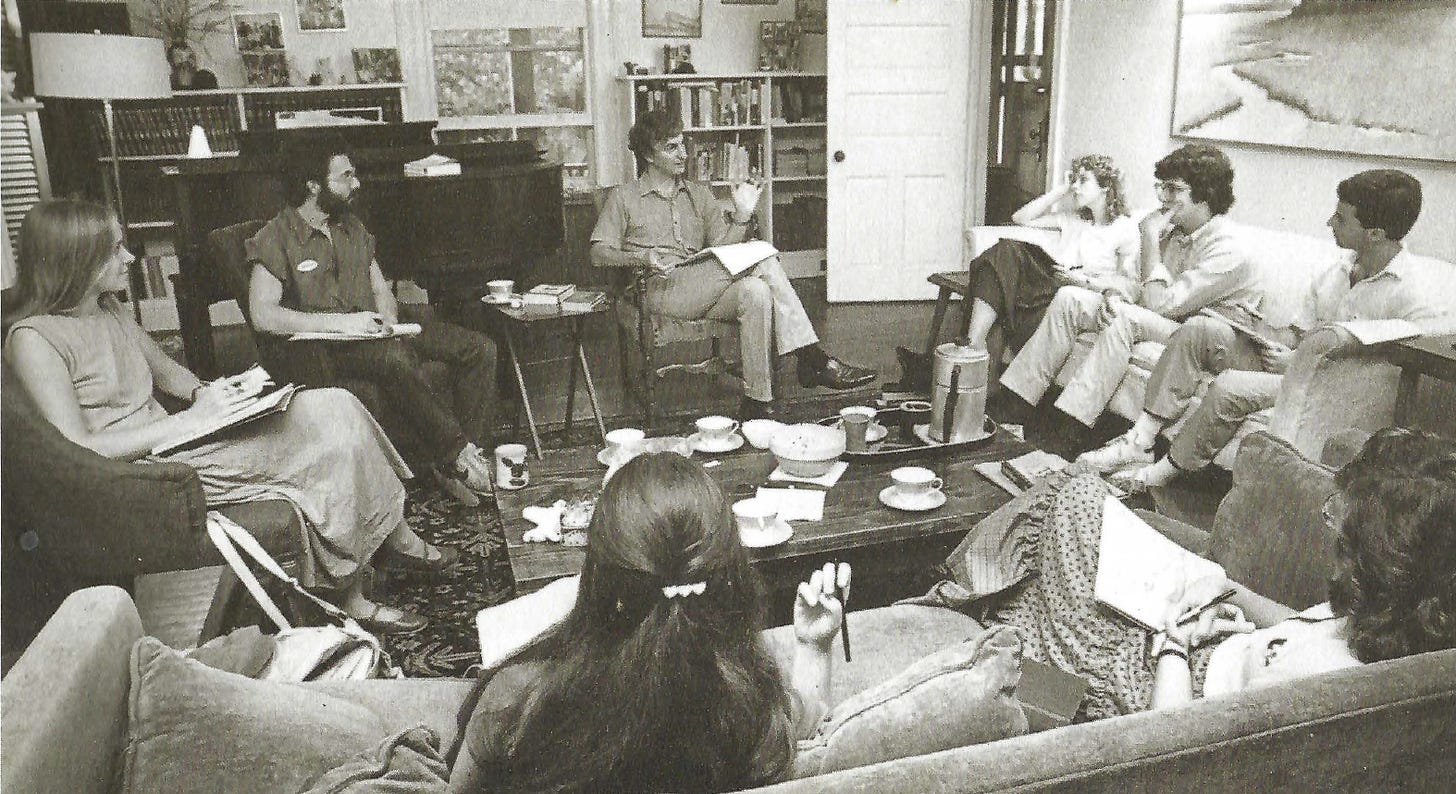Why College Is Still Cool
Protests, prices and pretension aside, there's still nothing in life like an education.
Things are not going well for elite colleges these days. I attended two of them, so this strikes somewhat close to home. What’s happening, I think, is a departure from the real mission of higher education – the unbelievable impact of one student, working closely with one great professor. Welcome to this week’s Specific.
In a week or so, I’m getting on a plane, with the eventual destination of Poughkeepsie, New York. One of my daughters is going to graduate from Vassar. Another one graduated from Grinnell. My sister graduated from Haverford, and my ex went to Bryn Mawr. My father went to Williams. I went to Swarthmore I am all about small, liberal arts colleges. I think they’re the best.
I also spent three years in law school at the University of Pennsylvania, an enormous Ivy League school. The place was founded by Benjamin Franklin himself, basically owns West Philadelphia, and is widely regarded as a Big Deal. Remember the breakfast scene from Pretty Woman where Julia Roberts tells Richard Gere she quit school in the eleventh grade, and asks him how far he went? He looked at her and said, “I went all the way.” So did I. I know this territory.
Something different, and bad, seems to be happening to higher education in general now. For one thing, costs have become kind of insane. At some schools, a year of study has a price tag that’s closing in on $100,000. The competition to get in has also become kind of loony – Swarthmore, for instance, has an acceptance rate of 7%. At Penn, it’s even lower – 6%. These places are incredibly hard to get into. Kids who go to the best private schools in the country hire consultants, pack their schedules with AP classes and extracurricular activities, eat Adderall and endure all kinds of torture chasing admission to a place like Swarthmore. Occasionally they kill themselves.
And, of course, the recent protests have tarnished the image of elite academic institutions. Columbia just cancelled Commencement. Same at USC. There’s an article in the Wall Street Journal and/or The New York Times literally every day analyzing what’s going on. Encampments are being set up. Buildings are being occupied. Sometimes the cops are called. People in general, and parents in particular, are wondering whether the entire idea of higher education has become some kind of weird luxury brand.
In a way, they’re right. These places are often real-life Ralph Lauren ads.
Swarthmore is a great example. It’s like every single fantasy you ever had about college life lives and breathes there, year after year. The entire campus, for instance, is an arboretum. There is a small army of people taking care of the grounds, which include every imaginable species of tree, plant and flower, all of them labeled and tagged, including Latin names. There are woods on campus, with a creek and a winding trail, and occasional stone benches with quotes from Milton and Thoreau and so on that have been there for a century. Broad green lawns, and a flagstone walk leading down to the train station. In the spring – I am not making this up – it’s lined, top to bottom, with daffodils. Oh, and shaded by immense oaks.
The main building, Parrish Hall (where I lived for two years) was originally the entire college. The ground floor has twin parlors, featuring grandfather clocks and pianos, which students play. There is a rose garden. The President’s house is a three-story Second Empire structure built in 1879 – more huge trees, lawn, stone. There is an outdoor amphitheater, with (surprise) huge trees, and stone steps where, incidentally, Bruce Springsteen performed Born to Run for the first time ever back in 1978. Most elite small colleges are like this – beautiful, lots of money, tradition and history, and a storybook setting.
So what’s the point? Are these places just luxurious playpens for rich kids? Sometimes they are. It is very possible to attend one of these schmancy places, and emerge with a useless degree and a lot of dumb ideas and drinking stories. If that’s what you want, and you’re willing to absorb some punishment, you can definitely make a top college the expensive babysitting service a lot of people claim it is.
But if you don’t want to do this, what’s the point of a college education? At Faber College, the fictitious school where Animal House was set, there’s a statue of the founder with the slogan “Knowledge is Good” on it. Okay. What else is higher education actually for? What does it accomplish? Why is it such a big deal?
It’s a big deal because the reality of a place like Swarthmore is very, very different than the peaceful, storybook exterior. It’s important to understand this. In fact, it’s necessary. But first, some context.
The essence of the culture of an elite, liberal arts school like Swarthmore is drawn from White Anglo-Saxon Protestant elites, or WASPs. I am one, by the way. Incidentally, Theodore Friend, who was President of Swarthmore when I went there, had a son named Tad who wrote a brilliant book explaining WASP culture, if you’re interested.
Along with dogs and Fair Isle sweaters and country clubs, one of the pillars of WASPhood is being sure, at all times, to make it look like you’re not trying. Visibly expending serious effort on something you care deeply about is for other people. Or appalling strivers, like that dreadful Richard Nixon or that awful Tim Cook. WASPS need to appear casual at all times, effortlessly prosperous and comfortable. It has to look easy. A beautiful college campus like Swarthmore’s is perfect for this. Ralph Lauren made a fortune packaging this up and selling it.
However, the motto of the Israeli Mossad is, “By deception thou shalt make war” and the same is true of WASPS. Underneath the whole casual/effortless facade is a culture of discipline, deprivation, endless work and sometimes outright suffering. For example, WASP sports are things like crew, which involves rowing until you pass out. WASPs believe in cold showers, getting up early, and working, working, working. You may sow your wild oats on Saturday night, but hangover or no hangover, you’re fucking well expected to be up and ready Sunday morning.
What does this have to do with Swarthmore? Here’s what: underneath the green lawns and stately trees is a collection of incredibly ambitious, driven people who were and are focused, as a group, on pushing a bunch of very talented students as hard as they can, and students, in turn, who wanted to be pushed. Hard. Everyone was unbelievably ambitious. This is true of all elite schools.
This doesn’t make very evocative media stories, because it’s so boring, but it’s true. And where this got expressed was in my education. I had the priceless experience of studying, one-on-one, with world-class teachers. Today’s students still do. This is the simplest, most ancient form of scholarship imaginable, and it’s also the setting within which higher education does its actual magic. And magic it is.
There’s a great quote from William Garfield, who eventually went on to be elected President, about this. Garfield was talking about Mark Hopkins, a beloved professor at Williams. He said, “The ideal college is Mark Hopkins on one end of a log and a student on the other.” Just so.
At Swarthmore, the faculty consisted of people who were the absolute best in their field, and who also loved to teach, and work with undergraduates. These were people who had spent years, decades, deeply immersed in Shakespeare, or Nietzsche, or Dutch painting, or whatever. They absolutely were not fucking around – they were intense, demanding, often brilliant, and assumed you could handle everything they could (and did) throw at you. They thew a lot.
The relationship between students and these teachers was necessarily very personal. Again, think of student and teacher sitting on that log. I was enrolled in Swarthmore’s Honors program, which meant small seminars instead of classes, a ridiculous workload, and direct access, pretty much whenever I wanted, to my professors. It also meant that a lot of the weekly seminars (which lasted for several hours) met in my professor’s home.
That’s right. Think about that. Think about walking up the street with your books, a bunch of pastries (if it was your turn that week) and so on, knocking on the front door, and being ushered into Professor Weinstein’s living room, where you and six of your classmates were going to spend the next four hours discussing As I Lay Dying or Portrait of the Artist as a Young Man or the Nicomachean Ethics. Don’t believe me? I’m the guy sitting on the couch. In the middle. With … hair. Lots of hair.
And these people were teachers. They weren’t there to research, or to be technicians. They were there to work with students, to drive them forward, to share knowledge. For a young person, this was the equivalent of getting golf lessons from Tiger Woods, or lessons in stage presence from Taylor Swift. I’m twenty years old, I’m from Painted Post New York, and someone like this is delighted if I stop by his office and want to spend an hour picking apart The Odyssey:
Martin was a prolific scholar with wide-ranging interests and an accessible style. Among his many publications, some of the most notable include a translation of Aristotle's Nicomachean Ethics, a handbook on the meters of Greek and Roman poetry, and several books on ancient Greek constitutional history: Nomos and the Beginnings of the Athenian Democracy; Autonomia: Its Genesis and Early History; and his magnum opus, From Popular Sovereignty to the Sovereignty of the Law, for which he received the Goodwin Award of Merit from the American Philological Association in 1990, an organization he served as president in 1987.
Additional honors include his election as a member of the American Academy of Arts and Sciences in 1991, and as a member of the American Philosophical Society in 1993. He was an editor of the Cambridge Ancient History from 1976-92 and a selection of his articles and essays was reprinted in 2009 by the University of Pennsylvania Press as Language and History in Ancient Culture. On Martin's retirement, Ralph Rosen '77 and Joseph Farrell, professors of classical studies at Penn, solicited and co-edited more than 40 critical essays from their mentor's former students and colleagues for a Festschrift in his honor. Martin also received honorary doctorates from the University of Fribourg, Switzerland, and from the University of Dortmund.
Working with people like this changes you. And that change is the point of higher education. It’s so easily forgotten now, in the era of social media and sound bites and greed, conflict, marketing and bullshit. But it does. Higher education, at its best, is not about getting a job. It’s about becoming a better human being. How? By having someone who’s the best in their field look you right in the face and tell you you’re wrong, or you need to read two hundred more pages, or you’re missing the point, which is this. They’re not talking to a classroom full of people, one of whom happens to be you. They’re talking to you. This has several implications.
First, as a student you get a guided tour through the unbelievable richness, complexity and beauty of the culture we’re all part of. It’s so easy to miss, but having someone who really knows and really loves it show you, in depth, why Yeats was an incredible poet, is like having a million dollars dumped into your bank account. You can only really appreciate what’s there when someone shows you.
Second, you’re also expose to an incredibly diverse set of brilliant people, both faculty and fellow students. This is what “diversity” is actually supposed to be. For example, because it was founded by Quakers, Swarthmore has quite a few hardcore pacifists. I argued with several of them. I remember once, being in a debate with one, who said he would never agree to military service, for any reason. I said, “Well, what if EVERYONE did that?” He looked at me and said, “Well, there wouldn’t be any more wars, would there?” I thought about that for weeks. It had never occurred to me. Welcome to being educated. Sometimes it’s embarrassing.
Third, you learn to teach yourself. At this level, your professors aren’t there to spoon-feed you information. Instead, they give you the materials, you engage with it, and then discuss it. You teach yourself, and they direct you. Once you know how to do that, you can apply it to anything. I’ve taught myself content strategy, law, cooking.
Finally – and maybe this is the most important point of all – by being exposed to a group of people who really are the best – motivated, driven, brilliant – you begin to understand what being the best takes, and why it’s important. It’s said that we’re the average of the five people we spend the most time with. It’s true. A handpicked class of 300 or so means daily exposure to really, really smart people, The experience will draw out the smart in you, too. If necessary, it’ll pound it into you.
And the end result of all this education, which occurs by working one-on-one with a teacher, is that you become a better person. Better people are very hard to create. It takes a long time, a huge amount of work, and the results often don’t emerge for many years. But still, short of perhaps the military, higher education is the only institution that specifically exists to help make human beings wiser, kinder, more thoughtful, more informed. And to me, everything else about it is just a distraction.
The college experience and culture is probably overpriced. It’s possibly kind of silly. It’s overmarketed, too political, and there’s too much money and nonsense involved. It’s probably getting worse. But damn, inside all that, like the chocolate center of a Tootsie-Pop, may be the chance to work one-on-one with a really good teacher, which is the experience of a lifetime. I think college is still cool.










Well articulated thoughts!